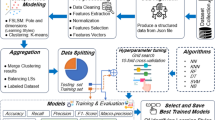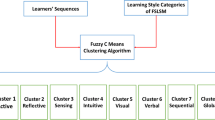Abstract
A learning style that focuses on individual learning is one of the most important aspects of any learning environment. Each learner has a unique manner of understanding, retaining, processing, and interpreting new information based on their learning styles. The ability of an e-learning system to automatically determine a student's learning style has become more essential. For learning events, the evolution of e-learning platforms provides students with higher opportunities online. In this paper, we proposed a Convolutional Neural Network-based Levy Flight Distribution (CNN-LFD) algorithm for learning style prediction. An adaptive e-learning system is divided into two sections: automatic learning style prediction and classification based on the number of learning styles included. Initially, the student logs in with their user ID, and the data is saved in the database. The features such as questionnaire score, login credentials (session ID, learner ID, and course ID), and login time (location, session ID) are extracted along with the sequence of the user's learning behavior. After that, the CNN-LFD algorithm predicts the learning styles of the learners namely Active/reflective, Sensing/intuitive, visual/verbal, sequential/global based on the extracted features. The dataset information are gathered from a Massive Open Online Course (MOOC), and the proposed model is built in JAVA software. The experimental results demonstrate higher classification accuracy during learning style prediction. The proposed CNN-LFD algorithm accomplishes 97.09% accuracy, 94.76% specificity, 92.12% sensitivity, and 97.56%, precision values than other methods.









Similar content being viewed by others
Data availability
Data sharing is not applicable to this article as no new data were created or analyzed in this study.
References
Chen C, Duh L, and Liu C (2004) A personalized courseware recommendation system based on fuzzy item response theory. In: Proceedings of IEEE international conference on E-Technology, E-Commerce, EService, Washington, pp. 305–308
Liye, Ma., Sun, B.: Machine learning and AI in marketing–connecting computing power to human insights. Int. J. Res. Mark. 37(3), 481–504 (2020)
Patrick, B., Doyle, E.: Individualising gamification: an investigation of the impact of learning styles and personality traits on the efficacy of gamification using a prediction market. Comput. Educ. 106, 43–55 (2017)
Khamparia, A., Pandey, B.: Association of learning styles with different e-learning problems: a systematic review and classification. Educ. Inf. Technol. 25(2), 1303–1331 (2020)
Sundararaj, V., Selvi, M.: Opposition grasshopper optimizer based multimedia data distribution using user evaluation strategy. Multimedia Tools and Applications, pp. 1-17 (2021)
Sivaranjani, J. and Madheswari, A.N., (2017) March. A novel technique of motif discovery for medical big data using hadoop. In 2017 Conference on Emerging Devices and Smart Systems (ICEDSS) (pp. 214-217). IEEE
Hari, V. and Madheswari, A.N., (2013) Improving Security in Digital Images through Watermarking Using Enhanced Histogram Modification. In Advances in Computing and Information Technology (pp. 175-180). Springer, Berlin, Heidelberg
Tarus John, K., Niu, Z., Yousif, A.: A hybrid knowledge-based recommender system for e-learning based on ontology and sequential pattern mining. Futur. Gener. Comput. Syst. 72, 37–48 (2017)
Gowthul Alam, M.M., Baulkani, S.: Reformulated query-based document retrieval using optimised kernel fuzzy clustering algorithm. Int. J. Bus. Intell. Data Min. 12(3), 299 (2017)
Sundararaj, V.: An efficient threshold prediction scheme for wavelet based ECG signal noise reduction using variable step size firefly algorithm. Int. J. Intell. Eng. Syst. 9(3), 117–126 (2016)
Gowthul Alam, M.M., Baulkani, S.: Geometric structure information based multi-objective function to increase fuzzy clustering performance with artificial and real-life data. Soft. Comput. 23(4), 1079–1098 (2019)
Sundararaj, V.: Optimised denoising scheme via opposition-based self-adaptive learning PSO algorithm for wavelet-based ECG signal noise reduction. Int. J. Biomed. Eng. Technol. 31(4), 325 (2019)
Gowthul Alam, M.M., Baulkani, S.: Local and global characteristics-based kernel hybridization to increase optimal support vector machine performance for stock market prediction. Knowl. Inf. Syst. 60(2), 971–1000 (2019)
Hassan, B.A., Rashid, T.A.: Datasets on statistical analysis and performance evaluation of backtracking search optimisation algorithm compared with its counterpart algorithms. Data Brief 28, 105046 (2020)
Hassan, B.A.: CSCF: a chaotic sine cosine firefly algorithm for practical application problems. Neural Comput. Appl. 33, 1–20 (2020)
Rejeesh, M.R.: Interest point based face recognition using adaptive neuro fuzzy inference system. Multimed. Tools Appl. 78(16), 22691–22710 (2019)
Sundararaj, V., Muthukumar, S., Kumar, R.S.: An optimal cluster formation based energy efficient dynamic scheduling hybrid MAC protocol for heavy traffic load in wireless sensor networks. Comput. Secur. 77, 277–288 (2018)
Sundararaj, V., Anoop, V., Dixit, P., Arjaria, A., Chourasia, U., Bhambri, P., Rejeesh, M.R., Sundararaj, R.: CCGPA-MPPT: cauchy preferential crossover-based global pollination algorithm for MPPT in photovoltaic system. Prog. Photovolt. Res. Appl. 28(11), 1128–1145 (2020)
Vinu, S.: Optimal task assignment in mobile cloud computing by queue based ant-bee algorithm. Wirel. Pers. Commun. 104(1), 173–197 (2019)
Fei, G., Li, Z., Jun, Yu., Junze, Yu., Huang, Q., Tian, Qi.: Style-adaptive photo aesthetic rating via convolutional neural networks and multi-task learning. Neurocomputing 395, 247–254 (2020)
Baidada M., Mansouri, K., Poirier, F. (2019) Personalized E-learning recommender system to adjust learners’ level. In: EdMedia+ innovate learning, pp. 1353–1357. Association for the Advancement of Computing in Education (AACE).
Ibtissam, A., Jeghal, A., Radouane, A., Yahyaouy, A., Tairi, H.: A robust classification to predict learning styles in adaptive e-learning systems. Educ. Inf. Technol. 25(1), 437–448 (2020)
Ouafae, E.A., El Alami, Y., Madani, El., Oughdir, L., El Allioui, Y.: A fuzzy classification approach for learning style prediction based on web mining technique in e-learning environments. Educ. Inf. Technol. 24(3), 1943–1959 (2019)
Deborah, L., Jegatha, R., Sathiyaseelan, S.A., Vijayakumar, P.: Fuzzy-logic based learning style prediction in e-learning using web interface information. Sadhana 40(2), 379–394 (2015)
Crockett, K., Latham, A., Whitton, N.: On predicting learning styles in conversational intelligent tutoring systems using fuzzy decision trees. Int. J. Hum Comput Stud. 97, 98–115 (2017)
Madani, Y., Ezzikouri, H., Erritali, M., Hssina, B. (2019) Finding optimal pedagogical content in an adaptive e-learning platform using a new recommendation approach and reinforcement learning. J Ambient Intell. Hum. Comput. pp: 1–16.
Ouafae, E.A., El Madani, Y., Alami, El., Oughdir, L., El Allioui, Y.: A hybrid machine learning approach to predict learning styles in adaptive E-learning system. In: International Conference on Advanced Intelligent Systems for Sustainable Development, pp. 772–786. Springer, Cham (2018)
Bhaskaran, S., Santhi, B.: An efficient personalized trust based hybrid recommendation (tbhr) strategy for e-learning system in cloud computing. Clust. Comput. 22(1), 1137–1149 (2019)
Sayed, W.S., Mostafa, G., Moemen, A., El-Tantawy, S.: Towards a learning style and knowledge level-based adaptive personalized platform for an effective and advanced learning for school students. Recent Adv. Eng. Math. Phys. 42, 261–273 (2020)
Rasheed, F., Wahid, A.: Learning style detection in E-learning systems using machine learning techniques. Expert Syst Appl 174, 114774 (2021)
Rajkumar, R., Ganapathy, V.: Bio-inspiring learning style chatbot inventory using brain computing interface to increase the efficiency of E-learning. IEEE Access 8, 67377–67395 (2020)
Hmedna, B., El-Mezouary, A., Baz, O.: A predictive model for the identification of learning styles in MOOC environments. Clust. Comput. 14, 1–26 (2020)
Lin, W., Xu, H., Li, J., Wu, Z., Hu, Z., Chang, V., Wang, J.Z.: Deep-profiling: a deep neural network model for scholarly web user profiling. Clust. Comput. 14, 1–14 (2021)
Zhang, W., Qin, S., Yi, B., Tian, P.: Study on learning effect prediction models based on principal component analysis in MOOCs. Clust. Comput. 22(6), 15347–15356 (2019)
Bernard, J., Chang, T.W., Popescu, E., Graf, S.: Learning style Identifier: Improving the precision of learning style identification through computational intelligence algorithms. Expert Syst. Appl. 75, 94–108 (2017)
Index of Learning Styles Questionnaire. Available online: https://www.webtools.ncsu.edu/learningstyles/. Accessed 29 February 2020.
Cook David, A., Thompson, W.G., Thomas, K.G.: The motivated strategies for learning questionnaire: score validity among medicine residents. Med. Educ. 45(12), 1230–1240 (2011)
Selvin, S., Vinayakumar, R., Gopalakrishnan, E.A., Menon,V.K., Soman, K.P. (2017) Stock price prediction using LSTM, RNN and CNN-sliding window model. In 2017 international conference on advances in computing, communications and informatics (ICACCI), pp. 1643–1647. IEEE.
Zhan, M., Gan, J., Lu, G., Wan, Y (2020) Graph convolutional networks of reconstructed graph structure with constrained Laplacian rank. Multimedia Tools Appl. pp: 1–12.
Tateno, K., Tombari, F., Laina, I., Navab, N. (2017) Cnn-slam: real-time dense monocular slam with learned depth prediction. In Proceedings of the IEEE Conference on Computer Vision and Pattern Recognition (pp. 6243–6252).
Zhao, R., Wang, Y., Liu, C., Hu, P., Li, Y., Li, H., Yuan, C.: Selfish herd optimizer with levy-flight distribution strategy for global optimization problem. Physica A 538, 122687 (2020)
Yang X.-S., Z. Cui, R. Xiao, A. H. Gandomi, M. Karamanoglu, eds. (2013) Swarm intelligence and bio-inspired computation: theory and applications. Newnes.
Marcin, M., Szczotka, W.: Quenched trap model for Lévy flights. Commun. Nonlinear Sci. Numer. Simul. 30(1–3), 5–14 (2016)
Alagarsamy S., Govindaraj, V., Irfan, M., Swami, R., Kumar, N. M. (2020) Smart recognition of real time face using convolution neural network (CNN) Technique.
Mokeddem, D, Nasri, D (2020) A new levy flight trajectory-based grasshopper optimization algorithm for multi-objective optimization problems. In: 2020 Second International Conference on Embedded & Distributed Systems (EDiS) (pp. 76–81). IEEE.
Hailun, X., Zhang, Li., Lim, C.P.: Evolving CNN-LSTM Models for time series prediction using enhanced grey wolf optimizer. IEEE Access 8, 161519–161541 (2020)
Shen, X., Yi, B., Zhang, Z., Shu, J., Liu, H. (2016) Automatic recommendation technology for learning resources with convolutional neural network. In:2016 International Symposium on Educational Technology (ISET), pp. 30–34. IEEE.
Everton, G., Miranda, R., de Barros, L., de Souza Mendes, : Use of deep multi-target prediction to identify learning styles. Appl. Sci. 10(5), 1756 (2020)
Author information
Authors and Affiliations
Corresponding author
Ethics declarations
Conflict of interest
The authors declare that they have no conflict of interest.
Human and animal rights
This article does not contain any studies with human or animal subjects performed by any of the authors.
Informed consent
Informed consent was obtained from all individual participants included in the study.
Additional information
Publisher's Note
Springer Nature remains neutral with regard to jurisdictional claims in published maps and institutional affiliations.
Rights and permissions
About this article
Cite this article
Alshmrany, S. Adaptive learning style prediction in e-learning environment using levy flight distribution based CNN model. Cluster Comput 25, 523–536 (2022). https://doi.org/10.1007/s10586-021-03403-3
Received:
Revised:
Accepted:
Published:
Issue Date:
DOI: https://doi.org/10.1007/s10586-021-03403-3




